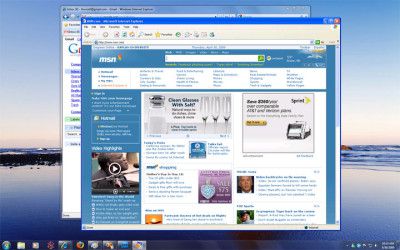From our front-page news:
When Windows 7 launches later this month, the majority of users will adopt Home Premium, thanks in part to its robust feature-set and also its price-point, at $199 for a full retail copy. For some, though, the decision to upgrade to either Professional or Ultimate probably lingers on one thing: XP Mode. Somewhat similar to a virtual machine, XP Mode would allow you to either run a full-blown XP environment, and also run applications through XP mode natively under 7.
In the screenshot below, you can see an example of this. Internet Explorer 8 is running in Windows 7 as normal, but IE 7 is running through XP mode, and you can tell because of the window border. All in all, it's a rather seamless experience by the looks of things. If you have a program that doesn't work well under Windows 7 for whatever reason, then trying your hand at the XP mode might be your solution.
I have yet to play with the feature myself, primarily because I didn't know how to install it under my Windows 7 Ultimate installation, but I didn't actually realize that it was a separate download, and not simply something that came with the OS. You must download Virtual PC, Microsoft's virtual machine platform, by going to the official website. From there, you select whether you have a 32-bit or 64-bit architecture, and also your desired language for XP Mode, and then download both the Virtual PC and XP mode software.
Note that although the RTM stage has just been hit, it's only available as the RC currently. You could expect the website to reflect the final version shortly. My question to you guys is this. If you are planning to upgrade to Windows 7, are you concerned by lacking a proper XP mode in the Home Premium version, or will you splurge the extra for this feature? Although Professional and Ultimate offer many features Home Premium doesn't, I don't think many of them cater to the typical user, so in that sense, XP mode would have quite the cost premium.

For home users, the new feature is equally exciting, giving many their first taste of the benefits of virtualization. Not only can it help them save on software costs, by running older versions of Office software or other programs, it can also allow them to play games that would run within Windows XP, but had trouble running within Windows Vista. For fans of PC gaming, this is a welcome feature. The virtual machine also helps to protect computers from online attackers when running. Many attacks exploit virtualization features as a foothold to launch attacks from.
Source: DailyTech
In the screenshot below, you can see an example of this. Internet Explorer 8 is running in Windows 7 as normal, but IE 7 is running through XP mode, and you can tell because of the window border. All in all, it's a rather seamless experience by the looks of things. If you have a program that doesn't work well under Windows 7 for whatever reason, then trying your hand at the XP mode might be your solution.
I have yet to play with the feature myself, primarily because I didn't know how to install it under my Windows 7 Ultimate installation, but I didn't actually realize that it was a separate download, and not simply something that came with the OS. You must download Virtual PC, Microsoft's virtual machine platform, by going to the official website. From there, you select whether you have a 32-bit or 64-bit architecture, and also your desired language for XP Mode, and then download both the Virtual PC and XP mode software.
Note that although the RTM stage has just been hit, it's only available as the RC currently. You could expect the website to reflect the final version shortly. My question to you guys is this. If you are planning to upgrade to Windows 7, are you concerned by lacking a proper XP mode in the Home Premium version, or will you splurge the extra for this feature? Although Professional and Ultimate offer many features Home Premium doesn't, I don't think many of them cater to the typical user, so in that sense, XP mode would have quite the cost premium.

For home users, the new feature is equally exciting, giving many their first taste of the benefits of virtualization. Not only can it help them save on software costs, by running older versions of Office software or other programs, it can also allow them to play games that would run within Windows XP, but had trouble running within Windows Vista. For fans of PC gaming, this is a welcome feature. The virtual machine also helps to protect computers from online attackers when running. Many attacks exploit virtualization features as a foothold to launch attacks from.
Source: DailyTech
